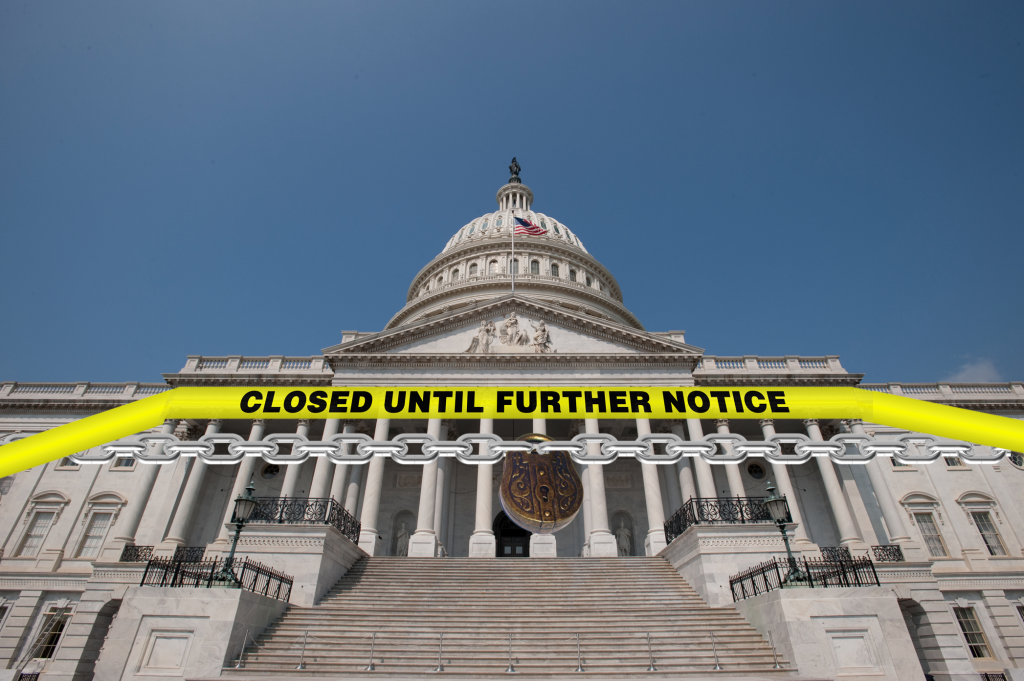Weekly Washington Outlook – October 7, 2013

What to Watch This Week:
Congress:
The House:
Although Majority Leader Cantor did not release a weekly floor schedule, the House this week is likely to continue its consideration of a series of piecemeal spending bills. On Monday evening, votes will be held to fund the FDA, followed by others to fund Head Start, border security, nuclear weapon safety, American Indian programs, education, and others later in the week.
The Senate:
The Senate will convene Monday to take up a judicial nomination. The body’s schedule the rest of the week is contingent on House action on a continuing resolution to fund the federal government. It is possible the Senate will take up a House-backed measure to provide retroactive pay for all federal employees.
White House:
Due to the shutdown, the White House has not released a public schedule this week.
Supreme Court:
Despite the shutdown, the Supreme Court begins a new term this week. The Court is expected to take up cases relating to campaign finance, abortion, public prayer, affirmative action, and the constitutionality of recess appointments. In many of these, there is speculation that the court will overturn existing precedent.
Also this week and beyond:
Shutdown – It is now Day 7 of the federal government shutdown and there are no clear signs that an end is in sight. While lawmakers stayed in DC over the weekend, there is very little indication that any serious progress was made toward reaching a solution. After a failed attempt to request to go to conference last week over the continuing resolution (CR), the House is now pursuing a plan to fund limited portions of the government while a longer-term solution is negotiated. These mini-CRs are designed to fund programs hardest hit during the shutdown, including among others, National Institutes of Health, national parks, Women with Infants and Children, the DC government, and the Federal Emergency Management Association. With the exception of back-pay for federal workers, the White House has issued a blanket veto threat for all of these and only the back-pay measure is expected to pass in the Senate.
Nonetheless, there seems to be a growing consensus that the way out of the current stalemate will involve linking a spending bill with language to raise the debt limit. It is likely that Republicans will also seek concessions to repeal the medical device tax, set guidelines for tax reform, and make changes to entitlement programs such as means-testing benefits and enacting chained CPI. Democrats have continued throughout to push for a “clean” continuing resolution and debt limit increase, making the details of any final spending-debt limit package remain somewhat elusive.
Yet, as the shutdown continues, its impact becomes increasingly detrimental as contingency funds are drained. Find out more about what is and is not open.
Debt Limit – While it appears that an increase in the debt limit will be a part of any solution to end the federal government shutdown, the Treasury continues to insist that this must occur by October 17th – the date Secretary Lew estimates the U.S. government will run out of borrowing authority. Speaker Boehner has said that he will not allow a default, yet, the insistence of coupling an increase with other policy provisions is something the President staunchly opposes. Failure to increase the debt limit on time could freeze credit markets, weaken the dollar, push U.S. interest rates up, and have negative effects on global markets.
Farm Bill – When the previous continuing resolution expired, so did the authorization for all Farm Bill programs. Through a series of parliamentary maneuvers, the House earlier merged its farm and nutrition pieces into one bill to go to conference with the Senate-passed Farm Bill. Last week, the Senate agreed and appointed conferees. The House has not yet done so although Speaker Boehner has said he will do so shortly. In the interim, there is renewed speculation that an extension or some form of compromise could be included in a final spending/debt limit package, but whether this will occur remains unclear. Without action, certain commodity price supports will revert to archaic levels making food prices generally more expensive (notably dairy).
Immigration – Last week, a number of House Democrats including Reps. Garcia (Fla.), DelBene (Wash.), Chu (Calif.), Polis (Colo.), and Horsford (Nev.) introduced a version of the Senate’s bipartisan immigration bill (S. 744). The bill put forward eliminates the Corker-Hoeven “border surge” language and substitutes the border security language generally with language backed by the House Homeland Security Committee. A majority of House Democrats have signed onto the bill as co-sponsors.

